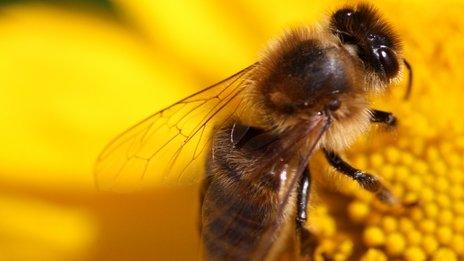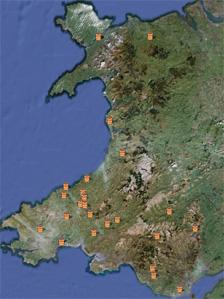Cardiff University in bee keepers' honey MRSA appeal
- Published

Researchers are looking for more honey from mid and north Wales
Bee keepers in mid and north Wales are being urged to help with research into the healing properties of honey as scientists look to counter MRSA.
Cardiff University and the National Botanic Garden of Wales launched the hunt last summer for honeys which can counteract bacteria.
They have created a honey map of Wales, pinpointing where the jars are coming from but they want to fill the gaps.
Bee keepers in south Wales and other parts of the UK are taking part.
Honey's anti-bacterial properties have been known since ancient times and it is believed it was used by both the ancient Greeks and Egyptians.
Since last summer's appeal, scientists at Cardiff University's school of pharmacy and pharmaceutical sciences have been analysing honey sent in from across the UK.
They are checking for honey with the potential to counter hospital acquired infections MRSA and Clostridium Difficile.
Then the National Botanic Garden in Llanarthne, Carmarthenshire, profiles the DNA of the most powerful honeys, checking for the plants which contributed.
This could allow scientists to create new treatments.
Prof Les Baillie of Cardiff University said: "We have had a very enthusiastic response to our honey appeal, with jars coming in from as far afield as the Isle of Wight.
"We've had some 200 samples sent in, 60 of them from Wales, and we have some very promising candidates for further research.

The research team has drawn up a honey map of Wales
"We now want to build up our picture of what's happening in Wales, and for that we need more honey from the middle and the north of country."
Festering wounds
Last year, scientists said Manuka honey could be used to combat some of the most hard-to-treat infections that are resistant to powerful antibiotics.
Lab experiments show it can clear bacteria found in festering wounds and contaminated hospital surfaces.
It works by breaking down the defences bacteria use against antibiotics, making it useful in treating super bug infections such as MRSA.
Cardiff University has asked any bee keepers keen to contribute to the project in Wales, to send a 200g pot with their address, postcode and details of the plants their bees feed on to Jenny Hawkins, Cardiff School of Pharmacy and Pharmaceutical Sciences, Cardiff University, Redwood Building, King Edward VII Avenue, Cardiff, CF10 3NB.
- Published13 April 2011